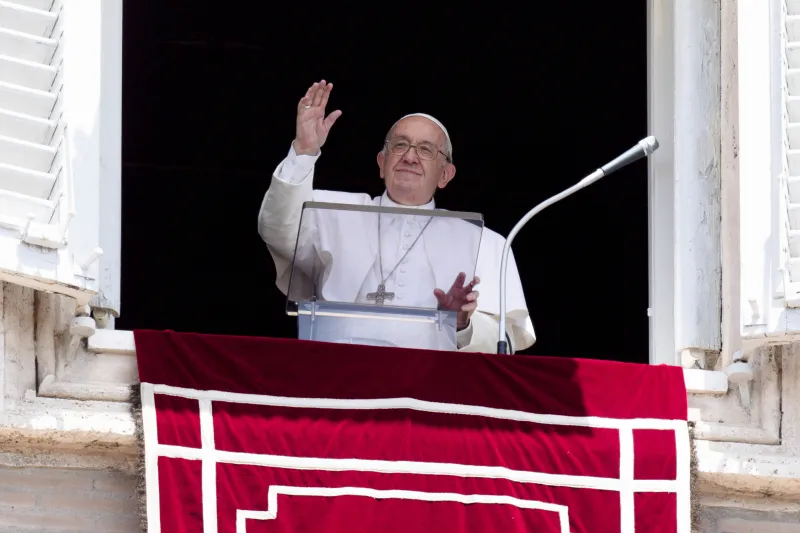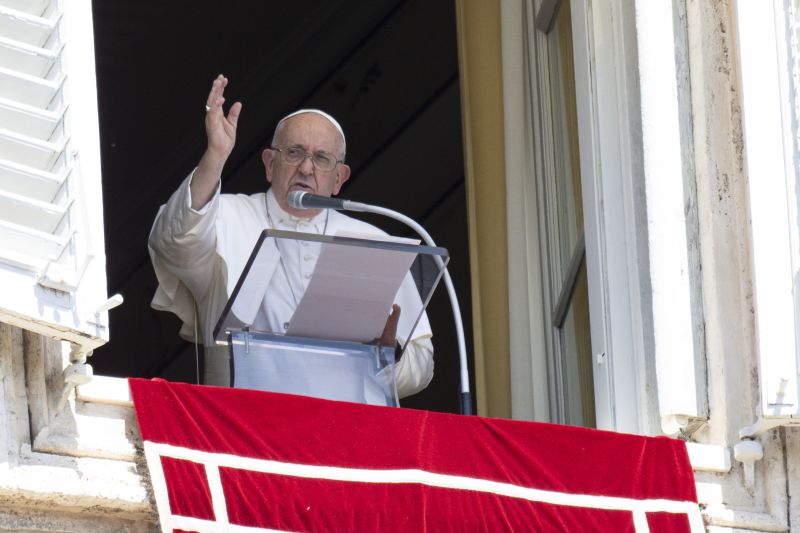
St. Louis, Mo., Jun 26, 2022 / 08:20 am (CNA).
In his Angelus address on Sunday, Pope Francis reflected on Christ’s “resolute decision” not to be overcome by anger in the face of unwelcoming adversaries, instead modeling the qualities of “calm, patience, longsuffering, not slackening the least bit in doing good.”
“It is easy, it is instinctive, to allow ourselves to be overcome by anger when faced with opposition. What is difficult, instead, is to master oneself, doing as Jesus did who, as the Gospel says, ‘went on to another village’,” the pope said June 26, reflecting on the Gospel reading from the ninth chapter of Luke.
“This means that when we meet with opposition, we must turn toward doing good elsewhere, without recrimination. This way, Jesus helps us to be people who are serene, who are happy with the good accomplished, and who do not seek human approval.”
Pope Francis said that sometimes people may think that anger in the face of opposition is “due to a sense of justice for a good cause.”
“But in reality, most of the time it is nothing other than pride, united with weakness, sensitivity, and impatience,” Francis noted.
“So, let us ask Jesus for the strength of being like him, of following him resolutely down the path of service, not to be vindictive, not to be intolerant when difficulties present themselves, when we spend ourselves in doing good and others do not understand this, or even when they disqualify us.”
The 85-year-old pope encouraged those listening to reflect on whether they ask God for strength in the face of opposition, or whether they seek human approval and “applause.”
“In the face of opposition, misunderstanding, do we turn to the Lord? Do we ask him for his steadfastness in doing good? Or do we rather seek confirmation through applause, ending up being bitter and resentful when we do not hear it?” the pope asked.
“Many times, consciously or unconsciously, we seek applause, approval from others, and we do things for applause. No, that does not work. We must do good out of service, not seeking applause.”
“May the Virgin Mary help us make the resolute decision Jesus did to remain in love to the end,” the pontiff concluded.
Following the address, Pope Francis expressed concern for the unrest happening currently in Ecuador, and urged dialogue and “all parties to abandon violence and extreme positions.”
He also mentioned Sister Luisa Dell’Orto, a Little Sister of the Gospel of Saint Charles de Foucauld, who was killed yesterday in the Haitian capital of Port-au-Prince.
“For twenty years, Sister Luisa lived there, dedicated above all to serving children on the streets. I entrust her soul to God, and I pray for the Haitian people, especially for the least, so they might have a more serene future, without misery and without violence. Sister Luisa made a gift of her life to others even to martyrdom,” the pope said.
Sunday marked the conclusion of the 10th World Meeting of Families, which took place in Rome from June 22-26. The gathering was attended by around 2,000 families from around the world.
The Angelus has its roots in a medieval practice of praying the Hail Mary three times in a row, as recommended by St. Anthony of Padua. Today, it takes the form of a papal custom on every Sunday and Marian solemnity, when the pope appears at the window of his library in the Apostolic Palace at noon to lead the faithful gathered below in St. Peter’s Square in praying the Angelus in Latin.
If you value the news and views Catholic World Report provides, please consider donating to support our efforts. Your contribution will help us continue to make CWR available to all readers worldwide for free, without a subscription. Thank you for your generosity!
Click here for more information on donating to CWR. Click here to sign up for our newsletter.






“We should meet abuse by forbearance. Human nature is so constituted that if we take absolutely no notice of anger or abuse, the person indulging in it will soon get tired of it and stop” – Mahatma Gandhi
With Pope Francis, yes, shun that anger within the soul that is self-destructive…but as for Gandhi’s wisdom, apparently Hitler and Stalin didn’t get that memo; nor in Nigeria, Boko Haram and now their splinter groups–they’re not tired yet.
As for the complete example of Christ, Christian charity and civility are certainly one thing, yes, but a footnote here on sometimes-conflated groveling by Christians, which is quite another. Josef Pieper observes Christ and then quotes Aquinas:
First PIEPER: “Christ drove the money-changers from the temple with a whip, and when the most patient of men stood before the high priest and was struck in the face by a servant, he did NOT turn the other cheek, but answered: ‘If there was harm in what I said, tell us what was harmful in it, but if not, why dost thou strike me?’” (Jn 18:23).
Then AQUINAS in his commentary on St. John’s Gospel:
“Holy Scripture must be understood in the light of what Christ and his saints have actually practiced. Christ did not offer his other cheek, nor Paul either. Thus to interpret the injunction of the Sermon on the Mount [turning the other cheek, Mt 5:39] LITERALLY is to misunderstand it. This injunction signifies rather the readiness of the soul to bear, IF IT BE NECESSARY, such things and worse, without bitterness against the attacker. This readiness our Lord showed, when he gave up his body to be crucified. That response of the Lord was useful, therefore, for our instruction” (Pieper, Fortitude and Temperance, 1954).
Aquinas’ “De Malo” (on evil/sin in general and on capital sin in particular) is not online, but Catholics would surely benefit from reading it. He distinguishes anger’s formal (reason/intellect/will) element from its material element (emotional response to the sense experience of pain or injury judged to be an injustice).
Reason– will–spiritual act–should control our anger so that we seek to correct injustices with due regard to the law (eternal, natural, man-made, etc.) which limits or allows correction.
To desire vengeance against sin (particularly our own) is a virtue. To desire and to take vengeance on another outside ordered LAW (to do away with the sin of another by doing away with another) is not within the individual’s freedom of law, so fomenting the emotion and acting on a desire for vengeance beyond that allowed o by law becomes a serious sin. Aquinas points out the beatitude of Jesus’ response to injustice but notes that men’s venial sins of anger are forgiven as we ask for forgiveness and forgive injuries received while uttering the Our Father.
Aquinas quotes scripture as justification for his many arguments. Ephesians 4:26 – ‘If you are angry, do not sin’ makes clear [says Aquinas] that anger is not [always] a mortal sin but is sometimes judged as reasonable and just. 2 Chronicles 2:15 – Elisha cursed a group of young boys (justifiably) and then two bears mauled them. The cursing because of extreme anger was not judged a mortal sin. Aquinas quotes Augustine’s City of God to note that Christian teaching does not consider whether one is angry but WHY. He quotes Gregory the Great and Aristotle. He disputes commonly accepted errors in Stoic philosophy on anger.
Oxford Univ. Press published the book “On Evil” in 2003. Discussion on anger is on pp. 371-387. Notes by Brian Davies.
[Today I heard the rumor that Francis has brain tumors.]
“People may think that anger in the face of opposition is due to a sense of justice for a good cause. But in reality, most of the time it is nothing other than pride, united with weakness, sensitivity, and impatience” (Francis). Our Lord says something quite similar to Catherine of Siena in her Dialogues. His intellectual, spiritual talent is evident here in his counsel on dealing with anger. If you accessed his spiritual commentaries when in Argentina shown on EWTN
it would be even more evident.
The pity and the problem is the transition, a different spirit, as supreme pontiff of the Church, not simply his demeaning behavior, explosions of anger and so forth, rather what’s perceived as guile. Subterfuge in nudging an agenda that effectively undermines the Catholic doctrine, the well known dual orthodox heterodox messaging. If it were an attempt to soften doctrine when exception occurs it would be more amenable. The difference is his disassembling of the very nature of permanency. Examples: On conscience and suggestion of absolute inviolability, “we are called to form conscience not to replace it” [Amoris 37]; On the mutability of all moral principles, “the further we descend into details the principle will be found to fail” [Amoris 304 in comment on ST 94, 4]; On mitigation Francis quotes catechism 2352 on masturbation suggesting that habit mitigates grave sin, whereas the Catechism refers to the young and immature not the adult engaged in adultery [Amoris 302]. Similarly the misleading comment on Aquinas in ST 94, 4 who comments on the Natural Law, Whether it is universally the same for all people he references difference among peoples, cultures that abrogate natural law either due to ignorance, or sin. The principle doesn’t change, rather it’s the people who wrongly observe the natural law who are subject to failure.
This modality of commenting on doctrinal principles is deceptive in Amoris, as elsewhere. At best a lack of intelligence, at worst intentional. Without offering judgment on the conscientious state of the man, that interior knowledge of the soul is exclusively God’s purview, we must make judgment on what is itself manifest to us. Knowledgeable of these evident errors that are necessarily within our purview, we’re indeed required to make judgment. Whereas, we err, perhaps gravely, if we correctly assume that since we cannot judge the man’s soul, we are obliged not only to refrain from judging him, but are also obliged to condone his errors by mistakenly affording them the benefit of our doubt, simply because they are the work of the Roman Pontiff.
From bouncer to Papa. It is well documented by reliable sources that his little flare-ups are quite regular! Some hold to the opinion that he might have done better in the former, rather than ;the latter.